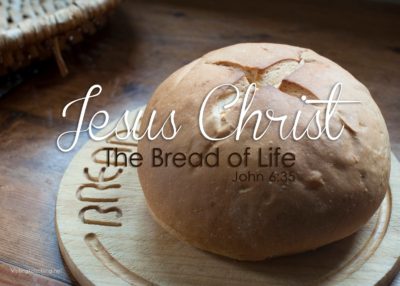Eighteenth Sunday in Ordinary Time
August 1, 2021 — Year B
Readings: Ex 16:2-4, 12-15 / Ps 78 / Eph 4:17, 20-24 / Jn 6:24-35
by Rev. Nixon Negparanon, Pastor
In last Sunday’s gospel, we read about the way Jesus fed a very large crowd of people with very limited resources—only five loaves and two fish. Everyone had their needs met. After that, Jesus and His disciples crossed the Sea of Galilee.
Today’s gospel tells us what happened afterwards. The people follow Jesus across the lake. When they meet Him, their reaction is, “Let us make Jesus our political leader, so we can eat well every day and have a supplier of our needs.” However, Jesus tells them frankly that they did not follow Him because they believed He was the Messiah, the Son of the Living God, and intended to grow spiritually. Instead, they followed Him because they merely wanted more food to eat.
The next part of the gospel confirms this. The crowd asks Jesus to do what Moses did for their ancestors: to give them more bread to eat. If Jesus does this, they will believe in Him. But then Jesus surprises them by saying, “I am the bread of life; whoever comes to Me will never hunger, and whoever believes in Me will never thirst.” (John 6:35)
Actually their request is legitimate. Psychologists speak about three levels of human nature, or I will call them three levels of human hunger. First, they say, we are physical creatures with sensual gratifications, like eating and drinking, which need to be satisfied. That is why we hunger for hundreds of things and have physical hunger which only food can satisfy. You cannot reason with a hungry belly, for it has no ears.
Second, they say, we are psychological beings, capable of using our minds, feelings, and imagination. Our motivations are the need for love, self-respect, fame, esteem. That is why we hunger for feelings of importance. We hunger for relationships, for without them we are like a lone tree on the top of a hill at the mercy of every wind that blows. We hunger for faith, for faith is better company than imagination.
Third, psychologists say, we are spiritual beings, having souls hungering for beauty, truth, wisdom, and eternal fulfillment. That is why we have a deeper hunger that underlies all of our other hungers—the hunger for the bread of eternal life, which is the hunger for God. “Do not work for food that perishes but for the food that endures for eternal life,” Christ admonishes.
Obviously Jesus does not mean that we should not work anymore, or indulge in recreation or forfeit family security. What He is saying is that we should not forget or neglect an equally important need in our life, the spiritual. Many people have not found true joy even though they have wealth, prestige, and power. Why? The Gospel has the answer to this: “One does not live by bread alone, but by every word that comes forth from the mouth of God.” (Matthew 4:4) Worldly finances, money, things, human relations, etc., are not enough to satisfy man. Man needs God, simply because he is from God. That is why St. Augustine said, “You have made us for Yourself, O Lord, and our heart is restless until it rests in You.”
If there are three levels of human hunger, there are also three kinds of food: material food, psychological food, and spiritual food. A person must feed himself with these three types of food in order to have real life. We need to have food and drink for our physical need. We need to be loved, for our psychological need. But what is the spiritual food, and where can it be obtained?
For those of us who have faith, spiritual food is the word of God, available in the scriptures and in the person of our Lord, Jesus Christ. There are people who barely have enough in life, work really hard and often work overtime to have something to feed the family. However, despite much time spent on work, they still have time for the Lord. It’s very touching to think that, in spite of how busy they are, they still exert effort and time in bringing themselves and their family to church to pray, to worship, and to participate in activities.
The material things are given to us by the Lord so that we may be happy. As we use them, however, we need to be careful and prudent. Many things can disturb us and consume our time for the Lord. Sometimes, even because of wealth, people forget that they have a need for God; they only remember to call on the Lord when they are in trouble. Therefore, we must pay close attention to the words of Jesus in the gospel today: “Do not work for food that perishes, but for the food that endures for eternal life, which the Son of Man will give you.”
In His suffering and death, Jesus gave Himself totally, so that our hunger for God would be satisfied. To give us a continuing share in the spiritual feast, He gave us His Real Presence in the form of bread and wine, this Presence we call the Eucharist. We believe that in the Eucharist, Jesus comes again to nourish us with His Body and Blood. The Eucharist is also a call for us to become Bread of Life to others in need around us.
 540-586-8988
540-586-8988 

